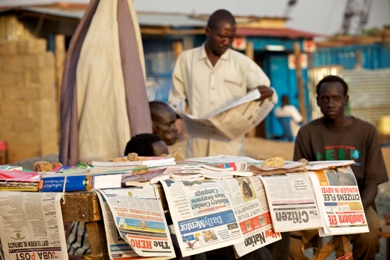S. Sudan media reject registration directive for journalists
December 4, 2013 (JUBA) – South Sudan’s media fraternity has condemned a directive by the information and broadcasting minister requiring that journalists register with the government.

The heads of various independent media outlets in the country failed to reach an understanding on the matter during a meeting on Tuesday with the minister, Michael Makuei Lueth.
Nhial Bol, editor-in-chief of The Citizen English-language newspaper told Sudan Tribune on Wednesday that media representatives were unable to reach a consensus with authorities because they rejected demands for the registration of all journalists.
Bol said journalists had pulled out of the meeting after accusing Lueth of acting outside of the law.
“The meeting with the minister did not reach any consensus. He (Lueth) wants all journalists to be registered. They need [a] curriculum vitae for individual journalists. This was rejected and the journalists pulled out of the meeting”, Bol told Sudan Tribune.
“There is no basis. The minister is acting outside of the law. It is just a verbal order. We asked him to put it into writing in the form of [a] ministerial order, but he did not do it. So there is no basis”, Bol added.
According to Bol, media houses can willingly register their staff, but individual journalists should not be forced to do so.
“As institutions, we have accepted and registered in compliance with the government policies, but we cannot force individual journalists to register because there is no law which calls for it”, he said.
He described the directive as “an unlawful act which cannot be encouraged”, stressing that media houses are willing to “hire lawyers to defend journalists in court” if the minister seeks to interfere in their operations.
ILLEGAL POLICY
Independent journalist John Augustine Justin expressed “deep concern” over the new directive, saying it is a tactic aimed at silencing the media.
“Instead of promoting and protecting press freedom the government wants to muzzle the press to avoid accountability. This is a dangerous move and the earlier the minister reconsiders his decision the better for all the stakeholders”, Justin told Sudan Tribune on Wednesday.
Editor-in-chief of the Juba Monitor Alfred Taban slammed the minister’s directive as “illegal and unconstitutional”.
“The minister [has] assumed the role of media authority, which is the body supposed to be handling such matters, but as you know, the bill which would regulate this body has not been passed into law. The Minister is therefore acting outside the law. The directives are illegal and unconstitutional”, Taban said.
JOURNALISTS “CROSSING THE REDLINE”
Meanwhile, a senior government official at the ministry of information and broadcasting claimed the institution is under intense pressure from the “higher authority” to ensure media do not cross the line.
“You know nobody is against the press freedom. This is a democratic country and we know the importance of the media. The media acts like a mirror. The problem is that some journalists want to report everything. They are crossing the redline”, the official told Sudan Tribune on condition of anonymity.
Human right organisations say violations to freedom of expression and personal freedoms are frequent in South Sudan, particularly towards critical voices.
The violations are perpetrated by government officials in positions of authority, as well as law enforcement agencies as a ploy to silence critics.
Journalists, members of civil society and human rights defenders have reported experiencing sustained harassment, including assaults, torture, death threats and unlawful arrests and detentions.
(ST)
